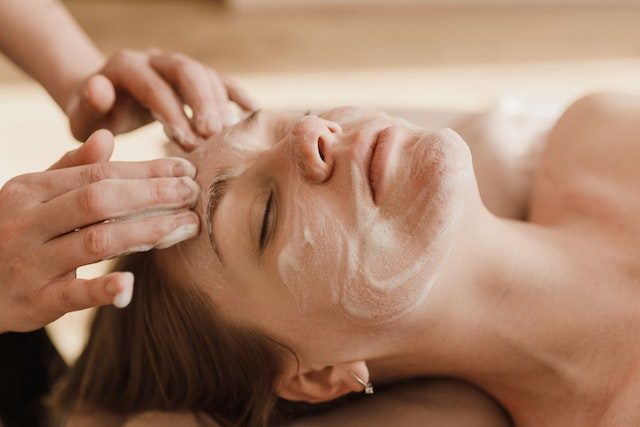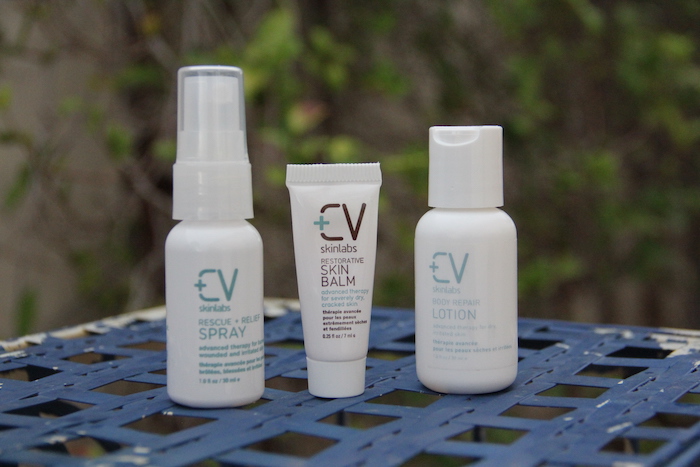
Have you heard of psychodermatology?
It’s a branch of medicine that addresses those skin conditions that have a psychiatric element to them.
In this post, we help you understand this fairly new area of skin care research and treatment. You may be dealing with a skin condition right now that could benefit from treatment in a psychodermatology clinic.
Psychodermatology: Where Psychiatry and Dermatology Meet
Psychodermatology is the study of the connection between the skin and the mind. We’ve talked about this connection before on CV Skinlabs, particularly how stress can cause dryness and accelerate aging.
According to the American Psychological Association (APA), there is a strong link between the skin and psychology. Scientists didn’t recognize how strong this connection was until recent years. In a 2020 review, they found that serotonin—the “good mood” neurotransmitter in the brain—plays a key role in skin homeostasis. (Keeping things normal.)
They also found that psychological stress can exacerbate skin diseases like psoriasis, atopic dermatitis, and eczema.
In another review, researchers found that not only does stress negatively affect the skin, but that there is “cross-talk” between the brain and the skin to the point that chronic stress can worsen skin aging. One study also showed that significant stress and anxiety were reported in 44 percent of patients before the initial flare of psoriasis, and in up to 80 percent of individuals with recurrent flares.
Other studies have found that among patients with disfiguring, chronic skin conditions, the prevalence of psychiatric disorders was 30-40 percent. And patients with skin conditions have been found to have a higher prevalence of psychiatric disorders than patients with cancer, heart issues, and brain disorders combined.
Even more interesting—research has found that stimuli received in the skin can influence the immune, endocrine (hormone), and nervous systems.
All of this shows us that the skin and the brain work together and that it makes sense to treat not just the skin, but the mind too.
Types of Psychodermatologic Disorders
According to research, psychodermatologic disorders fall into three categories:
- Psychophysiologic disorders: These conditions are associated with skin problems that are not directly connected to the mind, but react to emotional states like stress. Examples include psoriasis and eczema.
- Primary psychiatric disorders: These involve psychiatric conditions that result in self-induced skin conditions such as trichotillomania (hair-pulling) and delusions of parasitosis (the belief that one has bugs or worms crawling under the skin).
- Secondary psychiatric disorders: These are associated with disfiguring skin disorders. The disfigurement results in psychological problems like decreased self-esteem, depression, humiliation, or social phobia.
According to statistics, one-third of all patients in dermatology have emotional disorders. Here are some more examples of the types of skin conditions that fall under each of these categories:
Pychophysiologic disorders—those that can be exacerbated by stress and other emotional states:
- Acne
- Alopecia areata
- Atopic dermatitis
- Psoriasis
- Psychogenic purpura
- Rosacea
- Seborrheic dermatitis
- Urticaria (hives)
Primary psychiatric disorders—the psychiatric condition results in self-induced skin problems:
- Delusions of Parasitosis
- Dysmorphophobia
- Factitial dermatitis
- Neurotic excoriations
- Trichotillomania
Secondary psychiatric disorders—disfiguring skin conditions result in psychological problems:
- Alopecia areata
- Cystic acne
- Hemangiomas
- Ichthyosis
- Kaposi’s sarcoma
- Psoriasis
- Vitiligo
Doctors and dermatologists now know that understanding the psychological context of skin diseases is critical to managing them well. Once they diagnose a condition—either psychological or dermatological—they then use a dual approach to address each of them.
How Are Psychodermatologic Skin Conditions Treated?
Since not many people are aware yet of how closely connected are the brain and mind, it’s common for many patients with skin conditions to resist psychiatric consultation or treatment.
“I don’t need a psychiatrist!” a person with psoriasis might say.
The hope is that we can all get the message out there, as treating both sides of the problem can help anyone with a skin condition to better manage it and improve it.
As for how these types of conditions are treated, options include the following:
- Psychotropic medication
- Stress management courses
- Referral to a psychiatrist
- Relaxation/meditation techniques
- Support groups
- Topical treatments to address skin issues
- Oral medications if needed
Should You Incorporate Psychodermatology Into Your Skin Care?
Knowing how big a part your mental state can play in how your skin acts and feels can help you to find better solutions to any skin problems you may be facing.
Those with psoriasis, for example, may notice flare-ups when they’re stressed out, and may also suffer from self-esteem issues when the plaques are visible on their skin.
If you’re suffering from eczema, you may find that it gets worse when you’re going through a stressful time, which could ratchet your stress level up even higher.
Even if you have a mild to moderate case of acne, you may benefit from the specialized approach that psychodermatology can provide.
We give you some general approaches to managing your mind-skin connection below. But if you have a difficult skin condition that has not responded to other types of standard skin care, you may want to consider seeking psychiatric help as well.
Maybe your flares just keep coming back no matter what you do. Or you’re suffering from depression related to a skin condition that is affecting the quality of your life.
The point is to think about what else may be going on that is affecting your skin, and how you may be able to address it. For many patients, adding a psychological approach to their skin-care treatment plan can be life-changing.
Unfortunately, since this area of research is so new, there are only a few practitioners out there who truly specialize in psychodermatology. In addition, not a lot of insurance providers will pay for it.
If you’re struggling with a difficult skin condition, it can be worth it to seek out a provider who may be able to help you. Talk to your dermatologist about your options.
Using Psychodermatology In Your At-Home Skin Care Regimen
Meanwhile, no matter what your skin condition, the following mental-health practices can help improve it:
- Use the time you spend caring for your skin as stress-relieving time. Try to relax and enjoy the sensations. Add a candle, music, or mask to your routine to increase the calming effects.
- Incorporate at least one (two is better) stress-relieving practice into your daily routine. Good options include journaling, exercising, meditation, yoga, tai chi, pet therapy, writing down what you’re grateful for, and taking a walk.
- Make your before-bed routine sacrosanct. Have a set time when you start to wind down and include your skincare and relaxation techniques before bed.
- Use non-toxic skin care products like our CV Skinlabs products. Those with harsh chemicals in them can stress out the skin, making your skin condition worse and thereby contributing to psychological stress. Our products completely safe to use, even for the most sensitive of skin conditions. We don’t compromise efficacy, so our products work hard to help restore healthy, clear and radiant skin.
Did you know what pyschodermatology was?




